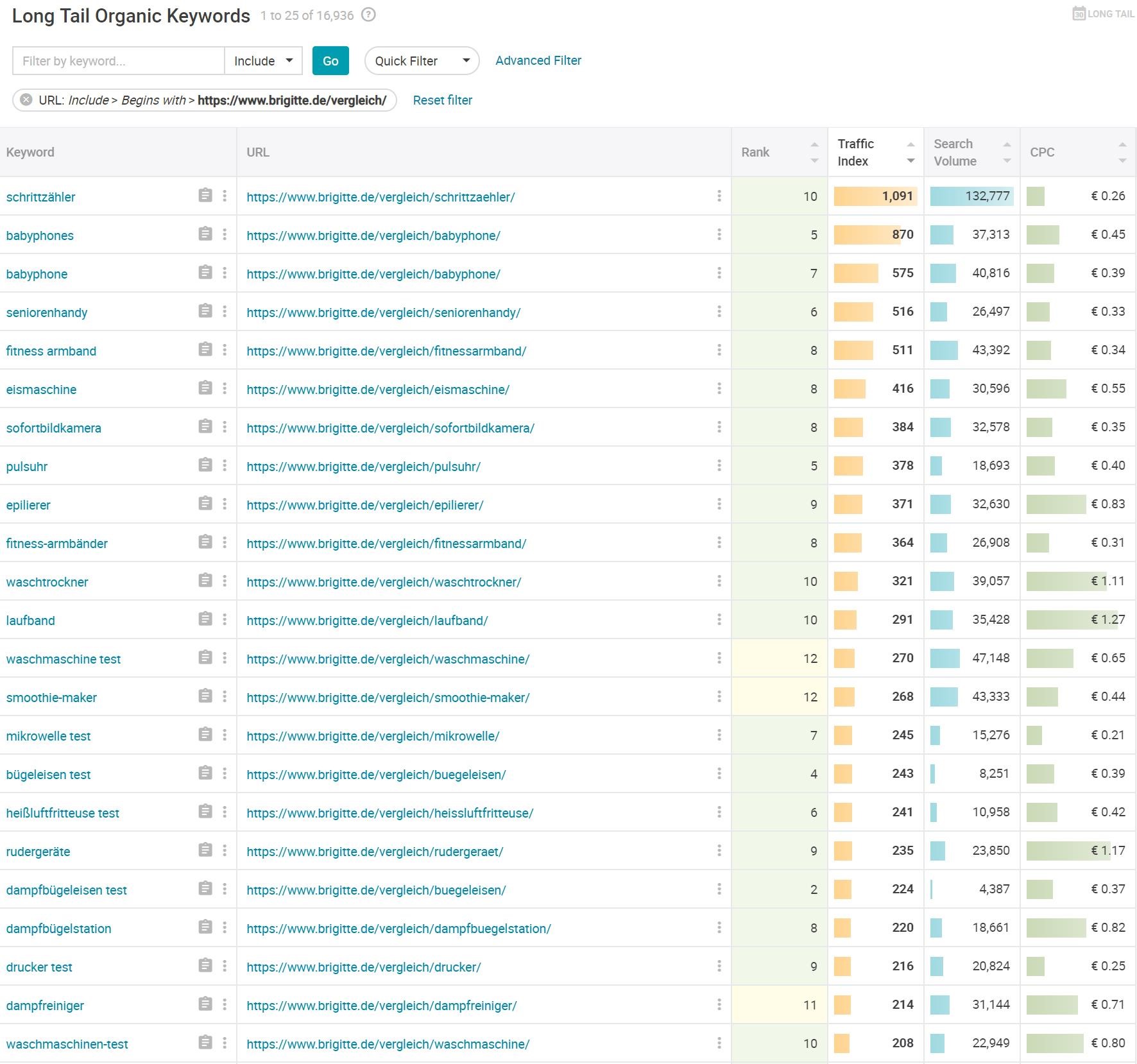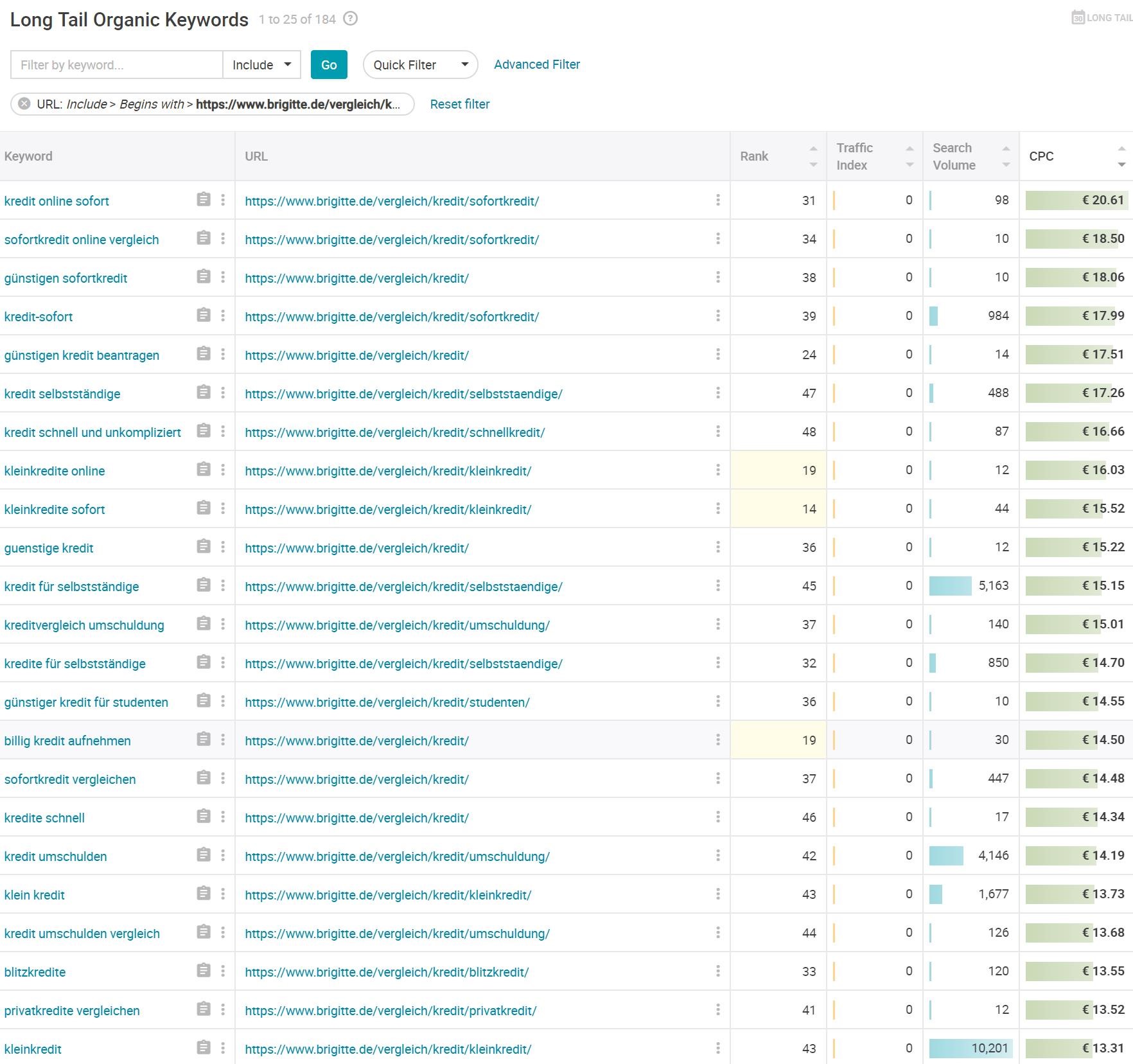If you use Google to search for a shopping voucher code or a product comparison, then you’ll often find that the top-ranked sites include publishers who have integrated white label solutions from large comparison or voucher platforms. This looked to be a win-win for both parties – but Google has now responded to criticism by strongly penalizing numerous subdomains and subdirectories that publishers were leasing to voucher sites. In this post, we’ll run through all the ins and outs of this online tactic, which, by the way, is Made in Germany. Who are the biggest websites involved in white labelling? How does it work? Which publishers are involved? And of course: who has been most severely hit by the Google Update?
UPDATE: Google penalizes voucher sites on publisher domains
If you haven’t yet read about how voucher and comparison portals have been generating enormous organic reach by renting subdomains or subdirectories from publishers, and using these to publish their white label sites, then you should start in the next section. If you’re already up to speed on the subject, then we’ve got news for you: Following months of intricate analysis of the phenomenon published by the anonymous Twitter account “LoisH”, we too decided to look at the subject. Soon after, the debate took off and Google announced changes to its ranking system.
The latest data shows that Google meant business and it has lowered the rankings of white label subdomains and subfolders belonging to large publishers. Examples include the German magazine “Stern”, which saw the SEO Visibility of its comparison directory drop by 41% in a three-week period. Its voucher directory took an even bigger hit, losing 50% of its SEO Visibility. Large UK and US publishers also saw significant losses for their voucher sections of their websites. Overall, there is a clear downward trend – especially if the voucher section is implemented on a subdirectory of the main domain. Publishers who have integrated voucher whitelabels as a seperate subdomain are less affected overall by the losses.
The following table shows the current SEO Visibility from the 1st of September 2019, with data provided for white label subdomains and subdirectories of selected major publishers in Germany, the UK and the USA. For many publishers – and therefore for the voucher and comparison portals – the fall season has kicked off with a big drop in their search engine performance:
| Publisher / Country | Subdomain or Subdirectory | SEO Visibility (1 Sep 2019) | SEO Visibility (11 Aug 2019) | Change |
| Stern.de / Germany | stern.de/vergleich | 98,697 | 166,900 | -41% |
| Stern.de / Germany | stern.de/gutscheine | 58,467 | 116,113 | -50% |
| Focus.de / Germany | gutscheine.focus.de | 39,.251 | 48,.828 | -22% |
| Bild / Germany | vergleich.bild.de | 13,832 | 13,100 | +6% |
| Business Insider / US | coupons.businessinsider.com | 278,008 | 289,.420 | -4% |
| CNN / US | coupons.cnn.com | 170,055 | 169,.979 | +0% |
| PC World / US | pcworld.com/couponcodes | 20,759 | 34,075 | -39% |
| Daily Mail / UK | discountcode.dailymail.co.uk | 72,244 | 75,242 | -4% |
| The Independent / UK | independent.co.uk/vouchercodes | 53,339 | 71,768 | -26% |
| The Telegraph / UK | telegraph.co.uk/vouchercodes | 21,117 | 25,886 | -18% |
White labelling for vouchers and product comparison: What’s it all about?
Voucher and product comparison sites are a big deal in Germany, which is home to numerous companies that operate across the globe. The business model is built on offering either online voucher codes or providing product comparison information. Any user who clicks on a link to a shop and completes a transaction will trigger an affiliate commission payment to the voucher/comparison site.
A large proportion of the traffic gained by these voucher and comparison websites comes via organic search. They do also make some use of Google Ads, but the paid ad model is not always profitable given the low-percentage margins that voucher sites work with.
For this reason, cooperating with large publishers represents a lucrative opportunity for voucher and comparison portals: The publishers set up a subdomain or subdirectory for the voucher sites, including an editorial disclaimer in the fine print, and they are paid for doing so by the voucher or product comparison site. In turn, the portals can present their own voucher and comparison content as a white label solution on the publisher’s subdomain. This enables them to profit from the enormous level of trust that Google assigns to publishers, which helps the white label landing pages to rank extremely well in the search results. A voucher or product comparison portal can rank multiple times with publisher white label landing pages in the top Google results – even though they are pushing near-identical content to various white label subdomains hosted by different publishers.
Could this be considered a weakness in the Google algorithm, one that lets publishers with a high level of trust rank high up in the search results for transactional search queries, just for integrating a white label solution for an online marketing platform with voucher and comparison topics, and without providing any unique content?
This trend was first brought into the public consciousness by “Loish”, who has already published several articles on medium.com and also discussed the topic at length on Twitter.
Business model Made in Germany: How German voucher portals white label the global publishing elite
The world leader in this online business is Germany, home to the headquarters of many of the leading voucher and comparison portals. The companies behind the voucher sites range from medium-sized Heidorn up to the Rocket-backed Global Savings Group. Sparwelt is based in Berlin and Zurich, and cooperates with websites belonging to the RTL Media Group. Savings United is also based in Hamburg, while Webgears and MenschDanke operate from Berlin.
As Germany is the global leader in terms of white label solutions on publisher sites, many other white label operators in other markets can also be traced back to Germany. Several of the UK’s largest publishers work with German white label solutions provided by Savings United (Hamburg) or the Global Savings Group (Berlin). Our analysis shows that many big UK publishers have already jumped on the white label bandwagon.
Overview UK: Publisher and voucher white labels
| Publisher | Subdomain or Subdirectory | SEO Visibility (11.8.2019) | Voucher Portal |
| Daily Mail | discountcode.dailymail.co.uk | 75,242 | Global Savings Group |
| The Independent | independent.co.uk/vouchercodes | 71,768 | Savings United |
| The Telegraph | telegraph.co.uk/vouchercodes | 25,886 | Savings United |
| NME | nme.com/discount-codes | 14,217 | Upfeat Media |
| Metro | discountcode.metro.co.uk | 10,661 | Global Savings Group |
| The Sun | thesun.co.uk/vouchercodes/ | 9,835 | The Global Voucher Group |
| Mirror | discountcode.mirror.co.uk | 6,412 | Invitation Digital Limited |
| Marie Claire | marieclaire.co.uk/vouchers | 4,951 | Upfeat Media |
| The Guardian | discountcode.theguardian.com/uk | 3,248 | Invitation Digital Limited |
While in the UK white labelling is already widespread, there appear to be a few major publishers on the other side of the Atlantic who are investing in this trend. It is quite extraordinary for an online trend to be Made in Germany and make it over to the USA. However, we see with CNN, Business Insider and the NY Post, that where US publisher subdomains do present white label vouchers, the operators of these voucher sites come from Germany.
Overview US: Publishers und voucher white labels
| Publisher | Subdomain or Subdirectory | SEO Visibility (11.8.2019) | Voucher Portal |
| CNN | vouchers.cnn.com | 169,979 | Global Savings Group |
| Business Insider | vouchers.businessinsider.com | 289,420 | Global Savings Group |
| PC World | pcworld.com/vouchercodes | 34,075 | Savings United |
| Wired | wired.com/vouchers | 28,117 | Savings United |
| NY Post | vouchers.nypost.com | 9,861 | Savings United |
Who ranks for „Walmart voucher code?“
Here, we will take a closer look at who ranks for a specific search query, in this example where a user is looking for a voucher code for Walmart:
At first glance, there would appear to be great diversity amongst the top results. However, if we look at the voucher portals behind the publishers who appear on the first search results page, we see a couple of familiar names.
Search results for “Walmart voucher code”: Ranking domains and, where applicable, the portal providing the voucher content
| Position | Ranking Domain | Voucher Portal |
| P1 | businessinsider.com | Global Savings Group |
| P2 | cnn.com | Global Savings Group |
| P3 | groupon.com | — |
| P4 | pcworld.com | Savings United |
| P5 | retailmenot.com | — |
| P6 | slickdealz.net | — |
| P7 | wired.com | Savings United |
| P8 | couponcabin.com | — |
| P9 | offers.com | — |
This shows that, although there would appear to be a range of different publishers amongst the top 10 whose brands command considerable trust, it is the voucher portals ranking with multiple pages under the guise of these publishers. In fact, the top two ranking positions are both occupied by the Global Savings Group, ahead of any voucher portals ranking with their own domains.
From a voucher provider to complete customer consultation service
You could argue that it isn’t necessarily a problem if online marketing companies offering voucher codes, who primarily rely on affiliate commission, take advantage of publishers’ trust with their white label solutions.
There is, however, a new take on this trend. We are now witnessing new white label subdomains and/or directories being set up on publisher domains that offer not just voucher codes, but a complete customer consultation service or product comparison information, including links to Amazon and other online retailers. The basic principle stays the same: The voucher or comparison portals generate vast quantities of similar content on a topic that is then presented (with small changes) as a white label solution on the publisher domains. Again, these landing pages benefit from the extremely high level of trust that news publishers enjoy as this helps them gain a huge amount of organic SEO traffic via top rankings in Google search. The publishers themselves have nothing to do with the content and the white label sections of the website have their own imprint/legal notice.
This trend was noticed in Germany only, but it is a huge step in terms of using Google’s trust in publishers. One reason for the emergence of this new trend could be that the SEO Visibility of voucher white label solutions has seen a decline of late, whilst product comparison white labels have been gaining significant traction. The following example shows the SEO Visibility curve for two subdomains situated at the German newspaper bild.de, demonstrating the contrasting fortunes of the voucher subdomain, gutscheine.bild.de, and the more recent product comparison subdomain, vergleich.bild.de:
Here are some German examples of publishers and their whitelabel vendors. This shows that the product comparison areas on the publisher’s websites did not appear until 2018 or 2019.
Overview in Germany: Publisher und product comparison white labels
| Publisher | Publication
topic |
White label directory or subdomain | SEO Visibility | Visible since | Comparison portal |
| Stern | Current affairs | stern.de/vergleich | 166,900 | March 2018 | Heidorn |
| Bild | News | vergleich.bild.de | 13,100 | March 2018 | Vergleich.org |
| Brigitte | Women’s | brigitte.de/vergleich | 8,473 | November 2018 | Heidorn |
| Süddeutsche | News | sueddeutsche.de/vergleich | 6,394 | July 2019 | Heidorn |
| Focus | Current affairs | vergleich.focus.de | 4,873 | March 2019 | Netzsieger |
The following shows an overview of transactional product keywords that brigitte.de ranks for. It’s a magazine for women featuring topics like relationship, gardening, health, clothing or nutrition. The keywords include topics like fitness equipment, washing machines and kitchenware.
Keywords like this aren’t necessarily a problem. The situation becomes more critical, when we see that brigitte.de also ranks for YMYL keywords – these are keywords that relate to long-term, high-impact consumer decisions. According to Brigitte’s own description, the magazine deals with „Fashion, beauty, diets and recipes…the topics that women are interested in”, and yet the white label comparison pages are also ranking for credit keywords, like “instant credit online comparison”, “credit fast” and “cheap credit application”.
This could be a major headache for big publishers. Many of them don’t only have voucher and comparison portals on subdomains or subdirectories, but also offer information on a whole range of consumer topics as a white label solution, as they look to monetize the trust of their news website. If we look at the example of focus.de, a popular German current affairs magazine, we see dozens of subdomains for all kinds of consumer topics, where the subdomains provide third-party content as a white label solution or partner offer.
Overview focus.de: Subdomains with SEO Visibility > 1,000
| Focus Subdomain | Topic | Visibility |
| kleinanzeige.focus.de | Classifieds | 121,726 |
| praxistipps.focus.de | Life hacks | 74,234 |
| gutscheine.focus.de | Vouchers | 49,175 |
| downloads.focus.de | Downloads | 40,685 |
| kuendigen.focus.de | Contract cancellation | 16,266 |
| games.focus.de | Games | 16,101 |
| girokonto.focus.de | Current accounts | 13,428 |
| tagesgeld.focus.de | Savings accounts | 7,745 |
| vergleich.focus.de | Comparison | 5,053 |
| krankenkassen.focus.de | Health insurance | 4,879 |
| tarife.focus.de | Subscriptions (energy, phones) | 4,231 |
| service.focus.de | Service | 3,616 |
| heizoelpreise.focus.de | Energy prices | 3,343 |
| unternehmen.focus.de | Business | 1,999 |
| hypotheken.focus.de | Mortgages | 1,536 |
| partnersuche.focus.de | Dating | 1,466 |
| online-broker-vergleich.focus.de | Investments | 1,284 |
Google announces algorithm changes
Google’s first public statement on the topic of white label subdomains came at the end of June. John Mueller, Webmaster Trends Analyst at Google, addressed the issue following a question from “LoisH” in a Google Webmaster Hangout Session. John Mueller’s position was that this wasn’t necessarily spam, but that it could be an indicator of low quality: “They’re just kind of sales pages, affiliate pages, that are hosted within another website“, he said. “Maybe the right approach is to find a way to figure out like what is the primary topic of this website and focus more on that and then kind of leave these other things on the side.” However, he is not in favor of downgrading all pages of this kind. You can watch his complete answer here:
The issue seemed to die down until August 2019, when Google announced changes to its algorithm that could mean that this practice could be set to stop (or be stopped) in the near future. Google’s webmasters made it clear on Twitter that the practice of white labelling does not strictly contradict Google’s guidelines, but they still advised against it. Google now intended to make changes to its ranking algorithm that would more appropriately evaluate this content that had nothing to do with the publisher website. Here’s the tweet from the Google webmasters:
We’ve been asked if third-parties can host content in subdomains or subfolders of another’s domain. It’s not against our guidelines. But as the practice has grown, our systems are being improved to better know when such content is independent of the main site & treat accordingly.
— Google Webmasters (@googlewmc) August 14, 2019
What do you think? Do you agree with John Mueller? Are voucher and affiliate pages spam? Is this an abuse of the Google’s algorithm’s trust in news publishers? Should Google do something? Let me know what you think in the comments!


